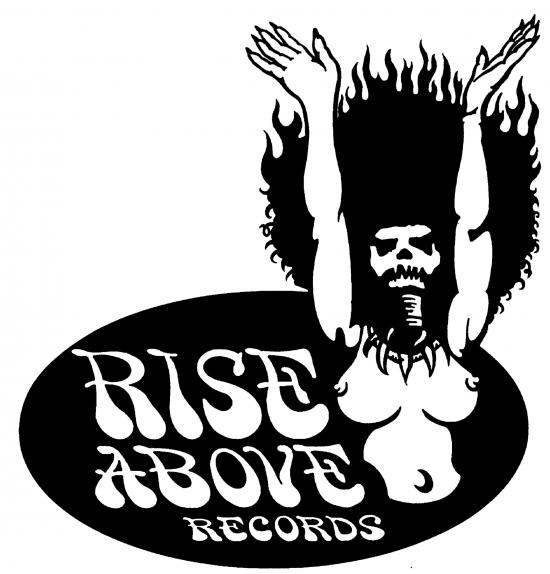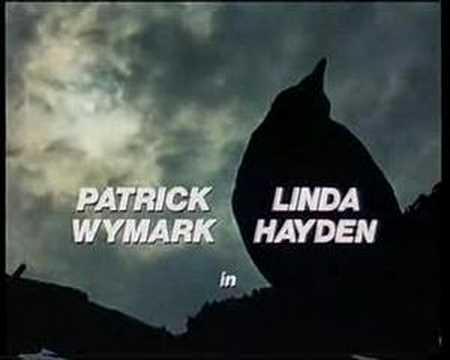Towards the conclusion of Jim Crace’s novel Harvest, the narrator takes to the plough:
"The key to ploughing is to hold a steady line, to be symmetrical […] A narrow scar is all we have in mind: a field length down, the headland turn, a field length back. We will, though, do our best to make a noble and an honest scar."
Lee Dorrian – founder and singer of Cathedral, the Witchfinder General, Virgil of the heavy rock underground, founder of Rise Above records – is somewhat world-weary. It runs counter to the sentiment of this digital age of self-exposure and over-sharing, glory-hunting and hyper-emotionality that a life of work, of holding the line and toiling over a narrow area of expertise, should be held up as either noble or honest.
As Rise Above approaches its 25th anniversary, marked by two gigs over the inter-festivum between Christmas and New Year at the Garage in Highbury, Dorrian struggles to step back and tell a story of the hand-to-mouth years during which he has run the label: "I just got my head down and got lost in it, got absorbed in it."
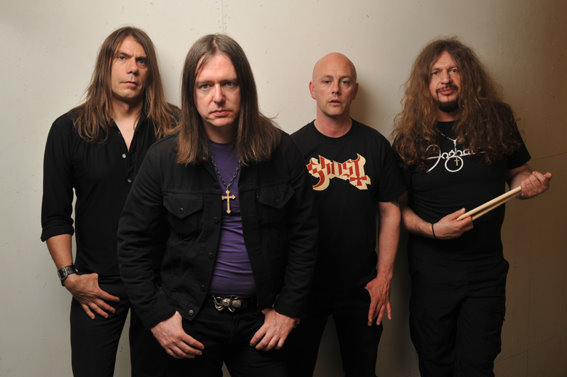
In 1988 Dorrian left Napalm Death, where he’d pushed anarchism into near-nuclear meltdown with his vocal abominations on their first two albums, Scum and From Enslavement To Obliteration. He started Rise Above to get off the dole, benefitting from the Enterprise Allowance Scheme, a Conservative government initiative which fronted cash to young entrepreneurs – it also facilitated the founding of another great independent extreme music label, Nottingham’s Earache Records, which was home to Cathedral for their important early albums.
The label took its name from a Black Flag song and early on set out to release hardcore records by the likes of S.O.B. The rest is tunnel vision: Dorrian only began taking a wage from the label three years ago, he’d waived his Napalm Death royalties, he worked in a clothes warehouse in Shoreditch for years to make ends meet, and a flood last year in their old office almost destroyed the operation.
"Rise Above is a protest song and in its own way Rise Above is a protest label, though it might not be overtly political. I wish there were more labels like this because there would be more records for me to buy."
An unwavering sense of doing the work because it was right kept the label alive, supporting bands because he believed in them and they believed in themselves. It’s a simple equation: "It’s hard work but it’s what I’ve chosen to do and what the bands on the label have chosen to do."
But honest work is not only about drudgery. In the opening of classic British horror film Blood On Satan’s Claw (1971), another ploughman pauses from his work to find that crows are picking at the eyeball of a decomposing face that has been churned up with the soil. Here’s the thing about Rise Above, as an expression of Dorrian’s tastes and beliefs, it has frequently unearthed the uncanny, and a constellation of unique, often strange and sometimes scary bands, unified by a label that stands itself outside of time: "I’ve never thought of it as being a label that’s strictly relevant to one time and in one place. I’ve always thought of it as just a continuing thing that’s not deeply rooted in the past or the future. I like to think that the records we release aren’t restricted by current trends, current fashions."
The label’s roster developed not through an overarching philosophy, but by instinct, which is probably why it appears so well crafted. One band that stands out and goes against the grain of a particular sound will influence another in a conjoining field in a different way, spawning a nexus of influence so all its acts seem the products of destiny: "The bands that play the music and appreciate the label are meant to be on the label."
Rise Above is also the root of the unwitting creation of the British doom scene. Whereas in the late eighties American acts like Solitude Aeternus, Trouble and Saint Vitus were established, Dorrian started Cathedral, an epically morose band with an excellent line in funereal dirges, and a glowering worldview on their debut album, Forest Of Equilibrium, exemplified in track titles like ‘Reaching Happiness, Touching Pain’ and ‘Commiserating The Celebration’. Though most of the band’s releases were outside of Rise Above, this year’s final album The Last Spire was released by Dorrian: "A tower of silence is waiting for me/ Looming before an astral sea/ Circle of time has stopped."
His curation of the early Dark Passages doom compilations and championing of bands like Penance, Revelation and Mourn defined a nascent British scene, developing in quality to match even the Sabbathian titans of Sweden’s Candlemass. But when Rise Above released Electric Wizard’s second album Come My Fanatics in 1997 they superseded them: "Come My Fanatics to me was the turning point of everything."
Electric Wizard’s brand of ‘Dorset Doom’ runs completely contrary to the surprisingly spiritual tendencies of Trouble and others. Its thick, chaotic and crushing sound takes inspiration from 1970s horror films and biker movies, and from the literary outsider (but internet meme perennial) HP Lovecraft and the circle of writers − many of whom worked for 1920s periodical Weird Tales − who developed the ‘Cthulhu Mythos’ of a tentacled-face ancient god whose re-awakening signals the end of the world.
This anti-mythology runs contrary to most of the religions in human history that seek to reconcile human beings with the cosmos by depicting a close, benign relationship between man and God. Electric Wizard channel the sentiments of Lovecraft in monstrous music that shows that man is not the centre of the universe, that the gods care nothing for him, and that Earth and its inhabitants are but a momentary incident in the unending cyclical chaos of the universe.
"By being uncompromising they’ve somehow managed to break the mould of traditional doom metal. A lot of doom has been very morose and slow and heavy which can be very off-putting. Electric Wizard sing of drugs and tripping and fantasy that is dark and otherworldly, a guitar sound like a chainsaw and a completely unpolished approach to the way they present themselves, but in a way that’s done through dedication. With time people have managed to come round to what they’re doing."
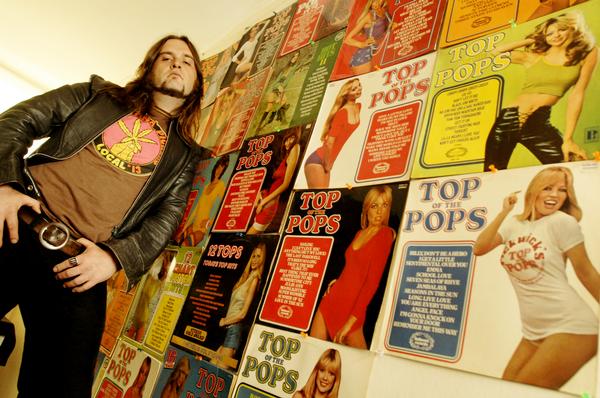
Electric Wizard is one of doom’s most successful bands but their uncompromising approach has recently caused a long and successful relationship with Rise Above to deteriorate. Band leader Jus Oborn advocates the legalization of drugs and murder in liner notes, but has reportedly also worked as a carpet-fitter and conservatory salesman. The friction of the heady abominations of the musical void and everyday reality is intense. Oborn recently stated that Rise Above was seeking to prevent them from releasing their new record, even using their name. "Complete nonsense" says Dorrian: they are still in an agreement with Rise Above and don’t want to be anymore, a difficult situation for him as a massive supporter of the band from day one.
"Electric wizard is a band that lives and operates in their own way and in their own world. And the idea of them being on a record label, as much as it’s been a way to get them acknowledged and people to hear them, I suppose they very much want to be their own band."
Back in the early years of the band’s relationship with Rise Above, as a trio completed by drummer Mark Greening and bassist Tim Bagshaw, Electric Wizard holed up and recorded Come My Fanatics by pushing a lot of expensive vintage equipment to its limits.
"Come My Fanatics blew everything apart and sent everything off the scale because it was a completely fuck-off sounding record. No frills but done with such fucking venom but also otherworldliness. When I first listened to it I was like ‘Fucking hell I can’t hear the drums’ but realized that it was a good thing that they were completely buried. I just got completely stoned and listened to it on my bed and thought it was the most amazing thing I’d ever heard."
This "dirtbowl of dirge" really established Rise Above as the doom label of choice in the late nineties, rivaled only by Southern Lord, started by Greg Anderson and Stephen O’Malley of Sunn 0))). Electric Wizard even topped themselves with magnum opus Dopethrone in 2000 during a really green, fertile period for the genre. Rise Above put out Anderson’s bulldozing second Goatsnake album Flower Of Disease and a litany of essential doom such as Grand Magus’s Monument, Orange Goblin, Church of Misery and Teeth Of Lions Rule The Divine, an underground supergroup featuring Iron Monkey’s Justin Greaves on drums, Dorrian and the Sunn 0))) duo.
These bands cemented the outsider status of the label but also expressed Dorrian’s fascination with the Seventies, signified not only in the bell bottoms that he wore in and out of Cathedral but also subsequently the more overtly retro sounds that the label fostered in the mid-2000s. It speaks to an off-kilter, resilient freedom summed up by the lyrics of ‘Born Too Late’ by Saint Vitus:
"Every time I’m on the street
People laugh and point at me
They talk about my length of hair
And the out-of-date clothes I wear
"They say my songs are much too slow
But they don’t know the things I know…"
The 15-year-old Dorrian might not identify with the middle-aged man sitting next to his collection of vinyl with his classic Vertigo artwork framed on the walls, but even back then he would go around to friends’ houses to listen to Ramases, Hawkwind and Aphrodite’s Child: "Things were generally a lot less restricted. Bands had a lot more natural expression. Major labels weren’t afraid to put bands out that were absolutely fucking crazy."
Rise Above signed medieval psych-folk band Circulus, the Swedish Pentagram-meets-13th Floor Elevators Witchcraft, and branched out further into jazz rock (Diagonal), space rock (Litmus) and most recently progressive pop band Hidden Masters: "As time goes on and you make these gradual changes it keeps the door wide open.’
Of course, this has also opened up the label to accusations of hipsterism. The hipster as a magpie for outsider culture firmly encountered the Rise Above ethos at ATP’s pivotal The Fans Strike Back Part 2 festival in Minehead in 2009. That saw Sleep reform to adulation and an audience far beyond what they’d left behind when they imploded over ten years previously. (Rise Above had previously controversially re-released Jerusalem, the bowdlerized version of Sleep’s hour-long hymn to marijuana, Dopesmoker).
The bill also featured Electric Wizard alongside Harvey Milk and Jesu. As tattooed and bearded long-hairs took advantage of the Butlins indoor waterslide and the bands wandered around the Somerset town wincing in the piercing May sunshine, doom was on the tips of being skewered by the Pitchfork of critical credibility. But the additional audience has definitely been good for sales over the subsequent five years.
Dorrian defends his position here, insisting that the trend has moved to him not the other way round: "People who’ve stuck with us through the years, they can depend on us to put out stuff that’s not going to be wishy-washy hipster crap. Though some people would say that’s exactly what we’re putting out.’
He’s also happy to dismiss any theory of retromania: "People get angry that everyone’s trying to be a retro band. Just put yourself into it and it’s always going to be original, whether it’s a style of music that’s been around for sixty years or what." This comes from painful experience, as Cathedral moved to Columbia records along with Carcass and other Earache signings in the mid-nineties they were almost overwhelmed by the major label exposure they were given; or rather, that wider exposure actually restricted commercial success by taking them too far away from their core audience.
When Led Zeppelin reformed in 2007, Robert Plant reflected on this in an interview: "The trouble is now, with rock & roll, it gets so big that it loses what was once a magnificent thing, where it was special and quite elusive and occasionally a little sinister and had its own world nobody could get in." The sweet spot is to build a band out of the underground in stages, not pluck them from obscurity: whatever critics think of newer signings like Uncle Acid And The Deadbeats and Blood Ceremony, there’s no doubt that Rise Above have nurtured their ability to make a cultural impact far beyond their supposed initial remit.
"We take each band we sign very seriously. A band like Ghost [Rise Above released their first album Opus Eponymous], as soon as I heard them I knew there was big potential for them. For people who say if it wasn’t for their image no one would give a shit, well I don’t think that’s the case at all. The songs on their first record are really killer songs, there’s no two ways about it. They write great melodies, just fantastic songs, and of course their image has helped, but they have become a band that everyone knows now, whether you know doom metal or know what the fuck Rise Above is. Everyone knows that the band exists."
You might not know the label, or its logo – the big-haired voodoo woman with the skeletal face and arms aloft – but anyone with a passing interest in rock has probably felt its creeping influence.
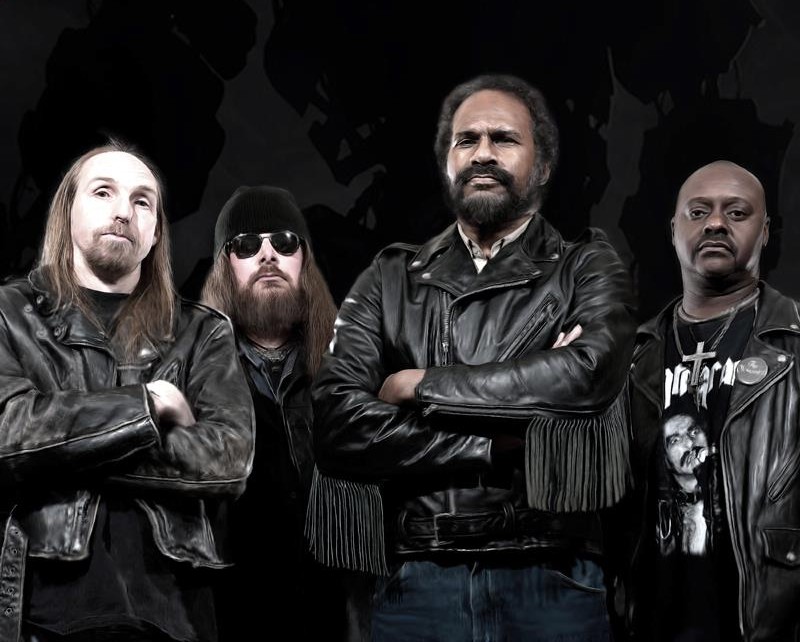
As I leave the two business units in Hornsey where the label is currently based I meet Cathedral guitarist Gaz Jennings as he’s packing up vinyl copies of Iron Man’s new album South Of The Earth. There’s initially a real dissonance finding one of the genre’s most gifted and transportative guitar players helping with a mail-out. But this is the nature of the work, perhaps it is the price for true independence, and the opportunity that a label like this affords is encoded in the lyrics of its origin song: "Rise above/ We’re gonna rise above."
The Rise Above Records 25th Anniversary shows take place on 27th and 28th December at the Garage in Highbury, London. Cathedral’s final album The Last Spire is available now on Rise Above Records

